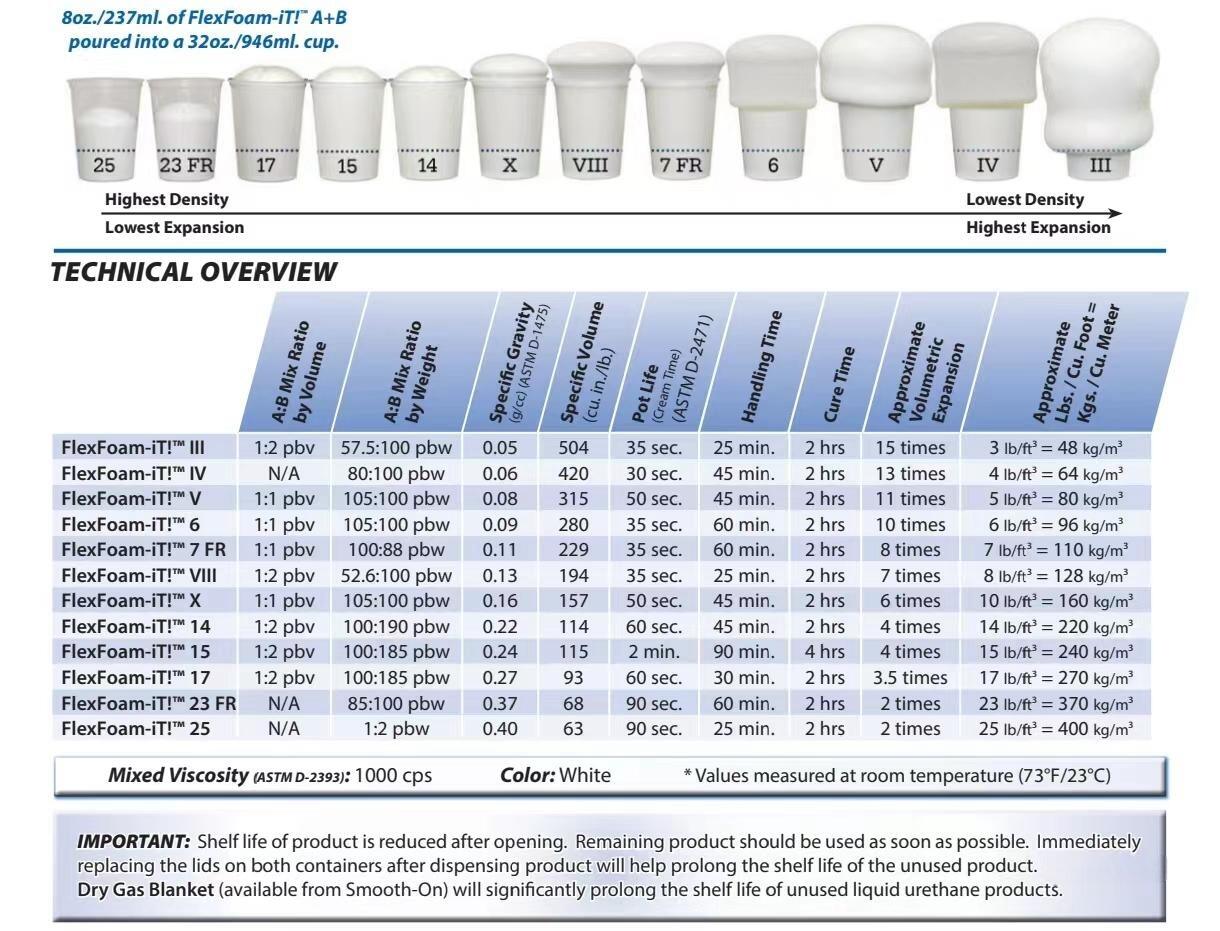폴리우레탄 폼
유연한 폴리우레탄 폼
3lb., 4 lb., 5lb., 6 lb., 7 lb., 8 lb., 10 lb., 14 lb., 15 lb., 17 lb., 23 lb. 또는 25 lb.
제품 개요
유연한 폴리우레탄 폼 시리즈는 다양한 산업용, 특수 효과 및 예술 & 공예 프로젝트에 사용할 수 있는 프리미엄 품질의 물기 발포 유연 폼입니다. 여러 가지를 선택할 수 있으며, 연극 소품(검, 칼, 망치 등), 산업용 패킹, 맞춤형 패딩 및 쿠션 등에 사용할 수 있습니다. 또한 유연한 폴리우레탄 폼은 좌석, 쿠션 및 사격 표적의 수리 재료로도 사용되며, 색상 효과를 위해 색소를 첨가할 수도 있습니다.
부품 A와 B 액체는 혼합되어 틀이나 기타 형태로 부어집니다 (필요한 경우 분리제를 사용). 혼합물은 빠르게 부풀어 오르고 고체 유연 폼으로 경화됩니다. 폼의 밀도에 따라 물리적 특성이 다릅니다. 숫자가 낮을수록 폼이 더 확장됩니다. 유연한 폴리우레탄 폼 III는 가장 낮은 밀도의 폼으로 가장 많이 팽창합니다. 유연한 폴리우레탄 폼 25는 가장 높은 밀도의 폼으로 가장 적게 팽창합니다. 유연한 폴리우레탄 폼 15는 비교적 긴 2분간의 작업 시간을 가지고 있습니다.
• 유연한 폴리우레탄 폼 IV와 유연한 폴리우레탄 폼 15는 매우 강한 'Tuff Stuff' 폼입니다.
• 유연한 폴리우레탄 폼 6과 유연한 폴리우레탄 폼 8은 베개나 쿠션 폼과 유사한 부드러움을 가진 'Pillow Soft' 폼입니다.
• 유연한 폴리우레탄 폼 7 FR은 FMVSS-302 사양에 따른 방염 등급입니다. • 유연한 폴리우레탄 폼 23 FR은 UL-94 HB 사양에 따른 방염 등급입니다
• 유연한 폴리우레탄 폼 IV와 유연한 폴리우레탄 폼 15는 매우 강한 'Tuff Stuff' 폼입니다.
• 유연한 폴리우레탄 폼 6과 유연한 폴리우레탄 폼 8은 베개나 쿠션 폼과 유사한 부드러움을 가진 'Pillow Soft' 폼입니다.
• 유연한 폴리우레탄 폼 7 FR은 FMVSS-302 사양에 따른 방염 등급입니다. • 유연한 폴리우레탄 폼 23 FR은 UL-94 HB 사양에 따른 방염 등급입니다

주입, 경화 및 성능...
주입 및 경화 - 최상의 결과를 위해, 혼합물을 포함 필드의 가장 낮은 지점에 한 곳에 쏟아서 혼합물이 수평을 찾도록 합니다. 거품이 최종 부피로 팽창할 때 성장할 공간을 포함 필드에 확보하십시오. 처리 전에 최소 30분 동안 거품이 경화될 수 있도록 하십시오. 경화 시간은 질량과 몰드 구성에 따라 영향을 받습니다.
질량 농도 / 몰드 구성 – 특정 몰드 구성에서 한 번에 많은 양을 부을 경우(즉, 실린더와 같은), 과도한 열이 발생하여 균열이 생길 수 있습니다. 계층별로 부는 방법으로 이 문제를 해결할 수 있습니다.
표면 마감 향상시키기 및 백 압력으로 공극 최소화하기 - 사전에 구멍이 뚫린 판으로 금형 개구부를 덮으면 일부 폼의 표면 마무리가 향상됩니다. 자세한 정보는 smooth-on.com/backpressure에서 비디오를 시청하십시오. 폼이 무너지는 현상은 낮은 온도나 충분하지 않은 혼합 또는 둘 다와 관련된 일반적인 현상입니다. 환경이나 재료가 너무 차갑습니까? 따뜻하게 하세요. 충분하지 않은 혼합인가요? A와 B 모두를 철저히 사전 혼합해야 합니다. A와 B를 섞은 후에는 완전히 혼합해야 합니다. 기계식 믹서기를 사용할 경우 30초 동안 혼합하십시오. 손으로 혼합할 때는 재빨리且강하게, 거의 재료를 채찍질하는 듯이 혼합해야 합니다.
적용 방법에 대한 질문이 있으면 언제든지 전화 주십시오
무료 통화: +86 13292123321 (WeChat 연동)
새로운 www.smooth-on.com은 금형 제작, 주조 등에 관한 정보로 가득 차 있습니다.

